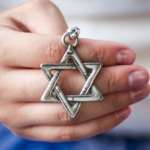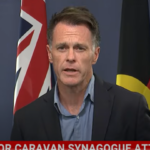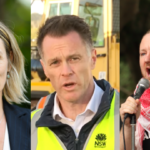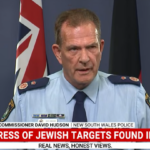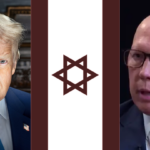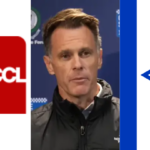NSW Premier Has Refused to Appear Before the Dural Caravan Inquiry
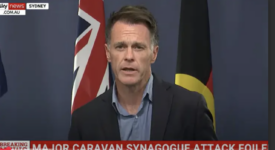
NSW premier Chris Minns confirmed on Tuesday. 17 June 2025 that he’s refusing to appear before the NSW upper house inquiry that’s trying to ascertain how much he knew regarding police considering an explosive-laden caravan found on a Dural property was likely a “fake terror plot”, prior to his passing a swag of criminal offences based on the incident, which was part of a broader staged “antisemitic” crimewave.
Minns made this clear to 2GB Radio shock jock Ben Fordham on Tuesday, as the Daily Telegraph had run a story about how upper house inquiry chair Independent MLC Rod Roberts would be signing summonses, calling upon the premier’s chief of staff and two deputies to testify at the inquiry, and the “pretty draconian” legislation invoked to do this could lead to their arrest if the staffers refuse.
An upper house inquiry cannot compel lower house MPs to testify. So, Minns is well within his rights not to show. But the first point of the inquiry’s terms of reference relate to how much he, NSW police minister Yasmin Catley and attorney general Michael Daley knew about NSW police doubts that the caravan was a legitimate terror plot prior to passing legislation predicated upon it.
Established on 19 March, the Select Committee on the Relationship between the Dural Caravan Incident and the Passage of Relevant Bills through the Legislative Council found, during its first hearing on 7 April with senior police, that Minns had been briefed “very early on” that the caravan may be a setup, yet he continued to suggest it could be a “mass casualty event” and “terrorism”.
So, the crux of the inquiry is did the NSW premier pass three tough-on-crime bills in response to “recent instances of antisemitic behaviour”, even though NSW assistant police commissioner David Hudson had told him “very early on” that there were serious doubts about the truth of the caravan incident, and it’s this particular matter that Minns has determined not to show his face in regard to.
The belle of the ball a no-show
Fordham explained on-air Tuesday that Roberts would be signing the summonses requiring three of Minns’ senior staff to testify, because, as the Telegraph outlined, the inquiry tried to interview the NSW premier and the police minister, who refused to show. And Minns then told the host that there are a “few reasons” behind his decision not to show up to the inquiry about what he knew.
“Firstly, we have a long – two long – periods of upper house investigations every year, estimates hearings, which I go to personally and they go for hours. They go for half a day,” the busy premier outlined. “Obviously, I’ve got question time every day that parliament sits, and I’m available to the media and anyone else that wants to ask me and the executive questions.”
“If the upper house did have their way,” Minns further put it to Fordham, “and this is a group of Liberal, Independent and Greens MPs, they’d have government MPs up there from the lower house, every 24 hours. They are incredibly investigation minded, and, at the end of the day, Ben, I’ve got other things to do.”
When Fordham suggested that Minns’ refusal was “a bad look… dodging an inquiry”, the premier retorted that it might appear dubious to the ill-informed but when people consider that he makes himself available to questions from the opposition every day that parliament sits and then twice a year during budget estimates, then those criticisms of his decision to dodge a bullet fall away.
The NSW Labor leader explained that the inquiry is a Liberal, Greens and crossbench investigation “that rests on the premise that the Dural caravan case was not a threat to the community” and that he and other ministers knew it was staged from the beginning and still pushed through vilification laws regardless, but that is not true, and he further added that “it’s a giant conspiracy”.
“I mean, we do make ourselves available to parliament, but the number of times and the number of inquiries they demand that I attend would make my job completely untenable,” the overworked premier outlined during the exchange.
Minns also added that the same goes for the NSW police minister, as “Yasmin would have had more questions from the opposition, probably, than anyone else in the place.”
“It’s a giant conspiracy”
As the NSW premier and the NSW police minister are refusing to testify before the Dural caravan inquiry, MLC Roberts is issuing summonses to Minns’ chief of staff James Cullen and his two deputies, Sarah Michael and Edward Ovadia, and the parliamentary legislation governing these matters can result in their being arrested if they don’t show up.
But all three had been called on to appear before a 22 May inquiry hearing, and they all refused the request via email on 16 May. This appears to be why Roberts has now issued 17 June summonses, along with the fact that three other Minns staffers did appear at the 22 May hearing, and it seemed they were chosen as they were so ill-informed, they weren’t unable to answer any questions.
The premier too wrote to lower house speaker Greg Piper on 15 May, regarding the inquiry terms of reference, as he considers they threaten the principle of comity, or harmony, between the houses of NSW parliament, and he added that he was going to raise a motion to have them scrutinised by the Standing Committee on Parliamentary Privilege and Ethics to see if the inquiry should be abandoned.
Piper replied to the premier that he considered this a choice approach to take, while in response to another question put to him by Fordham on 17 June, Minns said he doesn’t want his newly summonsed staffers to attend the inquiry whatsoever, because these are matters that the police should be investigating.
Laws passed as doubts abounded
The caravan inquiry covers the period between 19 January 2025, when a caravan filled with explosives and a note listing Jewish premises were located on a property on Dharug land in Dural, and it continues until 20 February, which was the date that two of the three bills containing laws “responding to recent antisemitic behaviour… in Sydney” were passed.
The bills were responding to the caravan full of explosives and a wave of “antisemitic” and anti-Israel graffiti and arson attacks across the Greater Sydney region commencing in late October 2024 and ending in early February this year. However, on 10 March, the Australian federal police and the NSW police both publicly revealed that the caravan and the entire “antisemitic” crimewave were a step up.
Questions then began being raised about how long law enforcement had considered all these incidents were a “criminal con job”, and how much the NSW premier and the police minister knew prior to passing rights-eroding legislation in respect of new hate crimes, restrictions on protest near places of worship, as well as some last minute incitement of racial hatred laws.
The public weren’t told about the caravan on discovery, but following a leak, Minns and NSW deputy commissioner Dave Hudson appeared before reporters on 29 January to explain the incident, and the premier then described explosive-laden caravan as a potential “mass casualty event”, and he further remarked, “There’s only one way of calling it out and that is terrorism.”
Hudson, however, told the ABC the following day, that NSW police was seriously considering the caravan incident was staged in order to appear like another threat against the Jewish community.
The deputy commissioner was right too, as when the AFP announced the entire crimewave was a “fabricated terror plot” in March, it came to light that the caravan was the work of organised criminals attempting to gain an advantage with police in regard to their own cases, whereby they’d provide tip offs about these antisemitic crimes in order to obtain lesser punishment in exchange.
The NSW upper house inquiry is attempting to understand when the premier became aware that police were questioning how genuine the caravan incident actually was, and during his appearance before it in April, Hudson told committee members that he was suspicious as to whether the caravan might be “a manipulation of the justice system” from “quite early on”.
“At my briefings, which were limited, with the premier, I expressed my suspicion over the motivation behind it from very early on,” Hudson made certain. And the senior cop also recalled briefing the police minister on 21 January, which did not involve Minns, but he considered he’d already previously filled in the head of the NSW Labor government by that stage.
Clearing the matter up with Fordham
The NSW premier, who described himself as “one of the most available and questioned politicians in the country”, told Fordham on Tuesday morning that he just doesn’t have the time for the inquiry, however he did find time to divulge to the NSW listening public some of the information that the inquiry committee members likely would have preferred they’d been able to question him about.
In terms of the inquiry itself, Minns described it as “Mr Roberts making a fairly outlandish conspiracy claim early on” and the independent member is “now desperately trying to find some kind of backfill evidence to justify it”. The premier added that he won’t find any because “there is none”.
Fordham asked Minns whether, after he’d been told by the NSW police deputy commissioner that the incident “might have a hoax element to it”, whether he’d “come clean straight away” or whether he’d “conceal that information”.
“Certainly didn’t conceal it,” the premier quickly responded back. “It was presented to me by NSW police at some point after the initial disclosure of the caravan, as part of one of several lines of inquiry.”
“Now, given those facts, I would have been in a position where I said, ‘It’s one of several lines of inquiry, is it?’ to the deputy commissioner. ‘Well, I am going to go out and do a media conference and say it might be this. I know you are investigating other lines of inquiry, as well.’”
In a statement released after Minn’s 2GB interview, the NSW Council for Civil Liberties outlined that the display was yet “another example” of the premier’s disregard for our democracy, and all NSW constituents should be deeply concerned about government ministers refusing to answer questions from other elected members.
“Chris Minns should be ashamed at his disregard for the health of our democracy here in NSW,” NSWCCL president Timothy Roberts said. “After acting so irresponsibly in passing these repressive laws – Minns will not, or cannot, defend them.”
“It is appalling that the premier and police minister have led the passing of laws criticised as being authoritarian, and then relied on executive power, liberties denied the rest of the citizens of NSW, in refusing to front up to a parliamentary inquiry that would otherwise assist in restoring community faith in our democratic processes,” the rights expert concluded.


